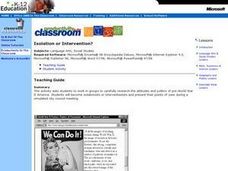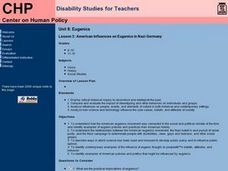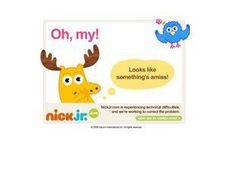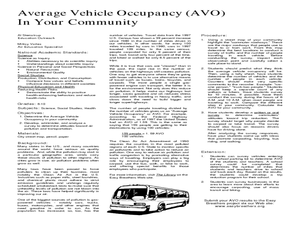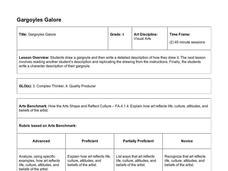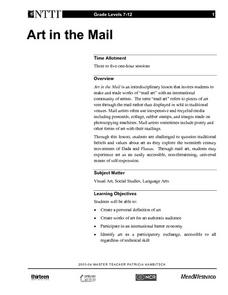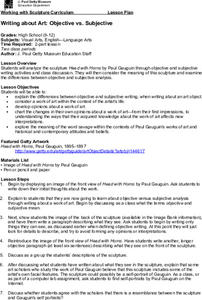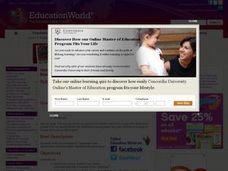Curated OER
Fairy Tales
Class groups examine fairy tales from a feminist and a Marxist perspective, identifying how these tales present gender roles and class/power systems. The groups then script and perform their own tale that uses one of these lenses.
Curated OER
American Transcendentalism and Buddhism:
High schoolers study American transcendentalism through readings of Emerson and Thoreau. They make cognitive connections to the similarities to Buddhism in these writings. The connection of the literary movement is explained in the art...
Curated OER
Lippmann vs. The Testers: Can Intelligence Be Measured?
Pupils examine the ideas of Walter Lippman and standardized testing. They discover the ideas and beliefs behind using standarized tests. They examine a copy of an IQ test and discuss.
Curated OER
The Will Of Ebenezer Wells
Students discover that a is a good source of information about history. They see that a may also provide information or clues about attitudes, beliefs, practices, and economic conditions of the time period and place in which it was written.
Curated OER
Pocumtucks In Deerfield
Learners read a story about the Pocumtucks' religious beliefs. Using the text, they discover their concept of land ownership and how they migrated within their territory in different seasons. They use primary and secondary sources to...
Curated OER
English Perspectives
Students perform research in order to answer an essential question: How did the cultural characteristics, beliefs, attitudes, behaviors, and economic conditions of the French, English, and Indians contribute to the growth of inter-group...
Curated OER
Isolation or Intervention?
Students research the attitudes and politics of pre-World War II America. They become isolationists or interventionists and present their points of view during a simulated city council meeting.
Curated OER
Muslims in Canada Today
Students investigate the Muslim presence in Canada to develop an understanding of the diversity within the Muslim faith community and the contributions Muslims make to society.
Curated OER
American Influences on Eugenics in Nazi Germany
Students examine the Eugenics movement in America. They discover the Nazi's belief in racial purity and how it relates to Eugenics. They also analyze how science has been influential in creating public policy.
Curated OER
Effective Citizenship
Students explore effective citizenship. They describe the skills, attitudes, and actions of a good citizen. In groups, students brainstorm ideas for effective citizenship. Each group shares their ideas for what they consider to be a...
Curated OER
Inside the Vault-Entrepreneurship
Students explore entrepreneurship. In this economic study lesson, students take a pretest on attitudes, review characteristics that make up an entrepreneur, review a list of famous entrepreneurs, and create a 5 minute oral presentation...
Curated OER
MAPPING THE BLACK ATLANTIC
Students examine the geographic characteristics of Western and Central Africa, the impact of geography on settlement patterns, cultural traits, and trade. They compare political, social, economic, and religious systems of...
Curated OER
Cultural Geography
In this Cultural Geography worksheet, students fill in answers to ten questions about cultural factors such as language and religion without using a word bank.
Curated OER
History & Civics Lesson for Grades 5-7
Young scholars become aware of the culture, lifestyles and attitudes of Native American kids living on the Crow, Navajo and Nez Perce; reservations.
Curated OER
Average Vehicle Occupancy In Your Community
Students determine the average vehicle occupancy in their community. In this transportation lesson plan students develop and analyze a survey to determine attitudes towards air pollution and transportation.
Curated OER
Unit on Religion and Globalization
In this religion instructional activity, students examine the role of religion and globalization. They discover the differences in attitudes toward globalization in different religions. They also examine how globalization has helped to...
Global Oneness Project
Repairing the Fabric of Democracy
During elections, headlines constantly lament the issue of low voter turnout. Help class members understand why this is such an important topic with relevant articles, a discussion of both sides of the issue, and a reflective essay.
Hawaiʻi State Department of Education
Angles on Kandinsky
Not only is Wassily Kandinsky fun to say, his art contains tons of angles. Learners discuss Kandinsky's music-inspired abstract art and four types of angles. They search one of his paintings for obtuse, right, straight, and acute angles,...
Hawaiʻi State Department of Education
Gargoyles Galore
Grrrrr, gargoyles are on the loose! Young artists are familiarized with the history of gargoyles, examine pictures of them, and hear a story about them. Then, they draw a gargoyle and write down exactly how they did it (procedural...
Curated OER
Art in the Mail
The "mail art" phenomena was started back in the 20's with the Dada and Fluxus art movements and revitalized in the 60's. The principle of mail art, is free exchange and artistic expression. Learners study these facts and then create...
Curated OER
Post-Colonial Writers Unit
How do cultural and historical background impact thought? To explore this essential question, class members view of portion of the film, The Passage to India, read an excerpt from The Magician’s Nephew, and Nissim Ezekiel’s poem, "In...
Curated OER
Writing About Art: Subjective vs. Objective
Explore objective and subjective writing in this interdisciplinary lesson plan, which brings language arts and visual art together. Middle and high school students examine the sculpture Head with Horns by Paul Gauguin. They then analyze...
Curated OER
Social Studies 11: Canada
You'll find questions regarding government, immigration, ethnic issues, suffrage, and turn-of-the-century history to complement any lesson on Canada. There are 17 questions in need of full-paragraph answers. A great resource to finish a...
Curated OER
Outgroup Experiment Reveals Bias, Stereotyping
Exploring bias and stereotypes, students dress up as members of "outgroups" (groups of people who are often judged). Though the instructional activity specifies that it should be "respectful and not mock the outgroup in any way," this...








